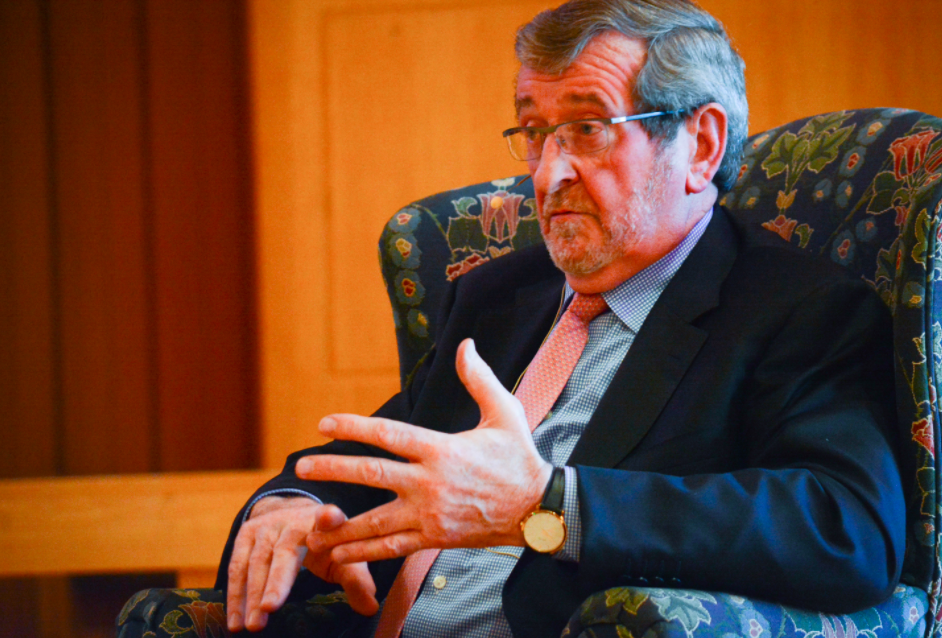COVID-19 vaccines might be available to the general public as late as July, Northwell Health CEO and President Michael Dowling said at a Blank Slate Media forum held via Zoom last Thursday.
“By the time we [finish vaccinating] all health care workers and nursing homes, and other essential workers, we’re probably into February, March, April before we get to the general public,” Dowling said.
He clarified later in the forum that “high risk” individuals and essential workers like police officers, firefighters and those working in transportation, among others, were scheduled to receive the vaccine around that time.
“Before the so-called general public gets the vaccine it will probably be June, July,” Dowling said.
He added that “high-risk” members of the general public would receive vaccinations before then and that the crisis was being prolonged in the United States due to “so many people who refuse to wear a mask.”
“The mask is the best treatment we have today, except for the vaccine itself,” Dowling said. “It is the single best treatment to begin to shut down and slow down the expansion of COVID.”
Both FDA-approved vaccines against the virus, the Pfizer vaccine, which Port Washington nurse Sandra Lindsay, director of critical care nursing at Long Island Jewish Medical Center in New Hyde Park, became the first American to receive last week, and the Moderna vaccine, will require two separate inoculations, Dowling said, though a one-dose vaccine currently in the works from Johnson and Johnson “holds an awful lot of promise.”
“If it gets approved, which we believe so, and it is made available, that will be the vaccine that we will be using, because it won’t require you to come back to get a second dose,” Dowling said. “You get it once, and you’re finished. But this whole process now is going to take, [and while] it’s good news, it’s fantastic news, it’s going to take many months to roll out.”
The medical community is still trying to come to terms with how long a vaccine dose will be effective, he says.
“There is no definitive agreement on how long the immunity is, but most people, including the people I talked to … I’m not a clinician myself as you know, but I spend my life around them,” Dowling said, “most people will tell you that it is at least a year, could be two years, but it is quite conceivable that [the vaccine] may be required.”
Another concern in vaccine rollout, he said, is that “an awful lot of people say that they’re unwilling about possibly taking the vaccine.”
“Most polls said that 50 percent of the public are kind of wait and see type of thing,” Dowling said. “My view of that is, the more people get vaccinated, the more we’re able to promote it we’ll be doing major communication campaigns over the next number of weeks and months to get to convince other people to take the vaccine.”
Seventy percent of Americans will have to receive the vaccine before herd immunity can be considered, Dowling said. He added that the question of large gatherings is often reviewed by Northwell’s clinical leadership and by national coronavirus task force member Dr. Anthony Fauci.
“Convincing people to get vaccinated would be the biggest task, and I think if we have to delay sports events and other large gatherings for a couple of more months, I think that’s just the choice we will have to make,” Dowling said. “I personally think you’ll be at the end of the summer before we can actually feel a little bit free, be a bit more flexible in opening up for large gatherings, sports events, et cetera. I think there can always be exceptions on this depending on the circumstance and the flexibility, but I think for the next six, seven, eight, nine months we have to be very, very careful.”
The executive also said that the health of Northwell’s employees was closely monitored.
“Probably the safest place to be right now is in a hospital because everybody is doing the right thing,” Dowling said. “We do test every employee who comes into the hospital, we check temperature. And we check to see whether there were any signs of ill health. If we know that an employee has been in contact, or close contact with anybody that might have a risk of having COVID they have to be quarantined for up to 14 days. Right now we have probably about 500 employees that are out, either because they have the virus or they’re being quarantined because they were close to somebody with the virus.”
He also touted the work of the system’s medical staff through the pandemic and recalled the fear felt in March.
“When you’re dealing with the unknown, it’s difficult,” he said. “There was a lot of fear, there was a lot of trepidation. Some people got sick at the beginning, [some] staff, and we were the first to require all staff wear masks. We were the first health system to do that. And that was a good thing because we had an experience at one of our emergency rooms and our clinical leadership said, ‘We just have to have everybody mask. This is too dangerous.’ … But I will say, though, that despite that trepidation, and that fear, the staff and what they did was absolutely extraordinary.”



